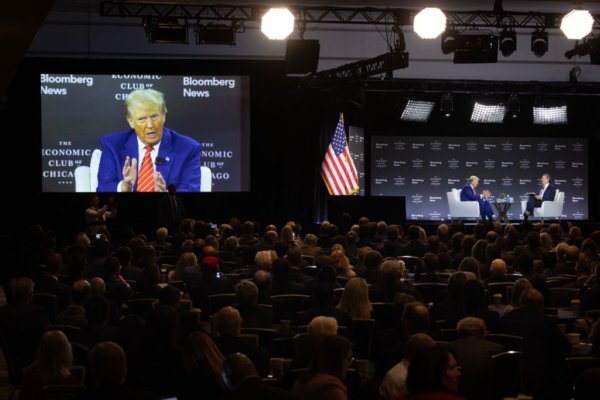Three weeks away from the US election, former President Trump sat down for a 90-minute interview with Bloomberg on Tuesday, October 15, to discuss various economic and social issues. His policy proposals received applause from business figures as he emphasized bringing back businesses to the country.
“We all care about growth,” Trump said during the interview with Bloomberg News Editor-in-Chief John Micklethwait at the Economic Club of Chicago. “We will bring businesses back to our country.”
Vice President Harris did not attend the Bloomberg interview, but she is set to appear on Fox News on Wednesday.
Polls predict a tight competition between Trump and Harris. The US economy is the top concern for voters, with worries about high prices and job insecurity tilting the public towards the policies of the Republican candidate.
Both Trump and Harris have been ramping up efforts to convey economic messages to voters, especially in key battleground states that may determine the outcome of the November election.
When asked about which states to watch closely on election night, Trump mentioned three states – Pennsylvania, Michigan, and Arizona. Pennsylvania and Michigan are two of the three Democratic “blue wall” states that Biden won in the 2020 election. These states could be crucial for Harris as well.
“Based on current voting trends, we are doing well,” Trump said, referring to early voting data.
Despite facing a series of legal challenges and being the first former US president to be convicted of a felony, Trump easily defeated his primary opponents in the 2024 campaign. His resilience seems evident, especially after surviving two assassination attempts.
After solidifying his base within the party, Trump aims to broaden his appeal to attract African American and Hispanic voters, as well as working-class voters and suburban women concerned about economic mobility – traditionally Democratic-leaning demographics.
Trump pledged to relax government regulations, extend expiring tax cuts, lower the corporate tax rate from 21% to 15%, and introduce new tax incentives and benefits to boost domestic manufacturing – policies supported by prominent figures in Wall Street and the business sector.
However, the tax cuts and benefits proposed by both Trump and Harris would require trillions of dollars, potentially exacerbating the federal deficit, which is nearing $2 trillion annually.
Trump emphasized significantly raising tariffs on foreign goods to “protect local businesses and attract new companies to set up shop in the US.”
“This won’t ultimately impact employment,” Trump said, indicating that any losses would be offset by new domestic manufacturing jobs.
“The higher the tariffs, the more likely companies are to enter the US and set up factories to avoid the tariff,” Trump added.
“I believe China (CCP) may be the toughest to deal with,” Trump mentioned when discussing US companies’ competition overseas.
Trump’s economic plan centers around tariffs – he intends to levy tariffs on allies and adversaries alike, including a 60% tariff on goods imported from China and a 10% tariff on other regions worldwide. Trump claimed that the new tariffs would help fund his tax reduction plan, but economists suggest that these tariffs are unlikely to generate the required revenue.
Trump also reiterated his opposition to US steel companies being sold to Nippon Steel; if such a deal occurs during his tenure, he would reject it. The Biden administration has strongly opposed this $14.1 billion transaction.
“I think it sets a terrible tone,” said Trump, emphasizing the critical national security interest of steel.
“Some companies you have to own,” Trump added.
Both US Steel and the United Steelworkers union (opposed to the deal) are headquartered in the swing state of Pennsylvania.
Regarding immigration, some business leaders expressed concerns that Trump’s immigration policies would reduce the available workforce, making it more challenging to hire workers.
“I want many people to enter our country, but I want them to enter legally,” Trump remarked, earning applause from the business community present.
The former president vowed that if reelected, he would complete the border wall construction at the US-Mexico border, reinstate entry bans on Muslim countries, and carry out mass deportations of unauthorized immigrants.
Trump also highlighted the threat to the US dollar’s reserve currency status posed by the Chinese yuan and other currencies, warning that the US would descend into a third world country if the dollar loses its status. He restated his previous commitment to imposing tariffs on trade partners unwilling to use the dollar.
When asked about the impact of his policy proposals on the dollar, Trump stated, “If I win, the dollar will be very safe. Your reserve currency will be the strongest ever.”
Earlier this month, Trump warned, “You are losing your reserve currency – the dollar. Beijing wants to take over.”
According to data from the Atlantic Council, the global forex trade is dominated by the dollar with less than 10% usage of the yuan.
As Trump discussed tariffs and the dollar, the dollar index continued to rise to the day’s highs.
“China (CCP) thinks we are a very stupid country,” Trump criticized the US’s past policies towards the world’s second-largest economy.
Under the phase one trade deal reached between the Trump administration and Beijing in early 2020, Chinese leader Xi Jinping agreed to increase the purchase of American goods and reduce the bilateral trade deficit. Bloomberg’s calculations show that Beijing has failed to meet its commitments, with China purchasing only 60% of the additional manufactured goods, agricultural products, and energy products promised by the end of 2021.

